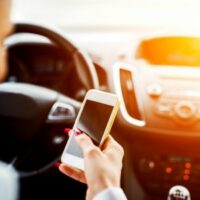Legal Options In Device Distraction Claims

As we move further into the smartphone era, a number of states have enacted hands-free laws which prohibit motorists from using their cell phones while they are behind the wheel. But Florida’s cell phone ban generally only applies to talking and texting. A use ban does apply in construction and school zones. Furthermore, localities may pass stricter laws in some cases. The good news for victims is that, in 2019, lawmakers added some language to this law which allows more aggressive enforcement of the existing law.
Device distraction is a serious problem in Florida and elsewhere. These wrecks kill or seriously injure hundreds of thousands of Americans every year. Since the average injury-related medical bill usually exceeds $50,000, these victims badly need financial compensation. A Tampa distracted driving accident attorney has several different options in this area. In one way or another, device distraction crashes almost always involve negligence, or a lack of care.
Negligence Per Se
Basically, negligence per se is a violation of a safety statute. In Florida, tortfeasors who violate such laws, like the cell phone law, and cause crashes are presumptively liable for damages. These damages include not only economic losses, such as the aforementioned medical bills, but also noneconomic losses, such as pain and suffering.
Because the Sunshine State’s cell phone ban is so narrow, negligence per se doesn’t apply in many Florida distracted driving wrecks. However, as mentioned, enforcement is more aggressive, so peace officers usually issue tickets whenever possible.
Victim/plaintiffs must introduce additional evidence to transform the presumption into a conclusion. Frequently, tortfeasors freely admit that they were using their phones while driving in these situations. They often think that such statements offer an excuse. But they are driving the nails in their own coffins, from a legal perspective.
Ordinary Negligence
Evidence is even more important in ordinary negligence claims. Since there is no presumption, victims must establish negligence by a preponderance of the evidence, or more likely than not. In addition to voluntary statements, evidence on this point includes:
- Erratic driving before the wreck,
- Presence of a cell phone in the passenger area, and
- Device use logs.
A few additional words about device use logs. Such evidence is often very compelling in court. However, it’s also often unavailable. Owners often “accidentally” delete this data before an attorney has a chance to look at it.
So, most attorneys immediately send spoliation letters in these situations. These letters create a legal responsibility to preserve all potential physical evidence, including device use logs, for later inspection.
These same principles apply to hands-free devices. Contrary to popular myth, hands-free is far from risk-free. In fact, driving while using such a device is as dangerous as driving while intoxicated.
Procedurally, most device distraction claims settle out of court. These settlements usually significantly benefit victim-plaintiffs. They end the case earlier, which means they get their settlement money earlier. Furthermore, negotiated settlements give the parties much more control over the outcome.
Connect with an Experienced Hillsborough County Lawyer
Injury victims are usually entitled to significant compensation. For a free consultation with an experienced personal injury attorney in Tampa, contact Mark H. Wright, PLLC. Attorneys can connect victims with doctors, even if they have no insurance or money.
Resource:
flhsmv.gov/safety-center/driving-safety/distracted-driving/
